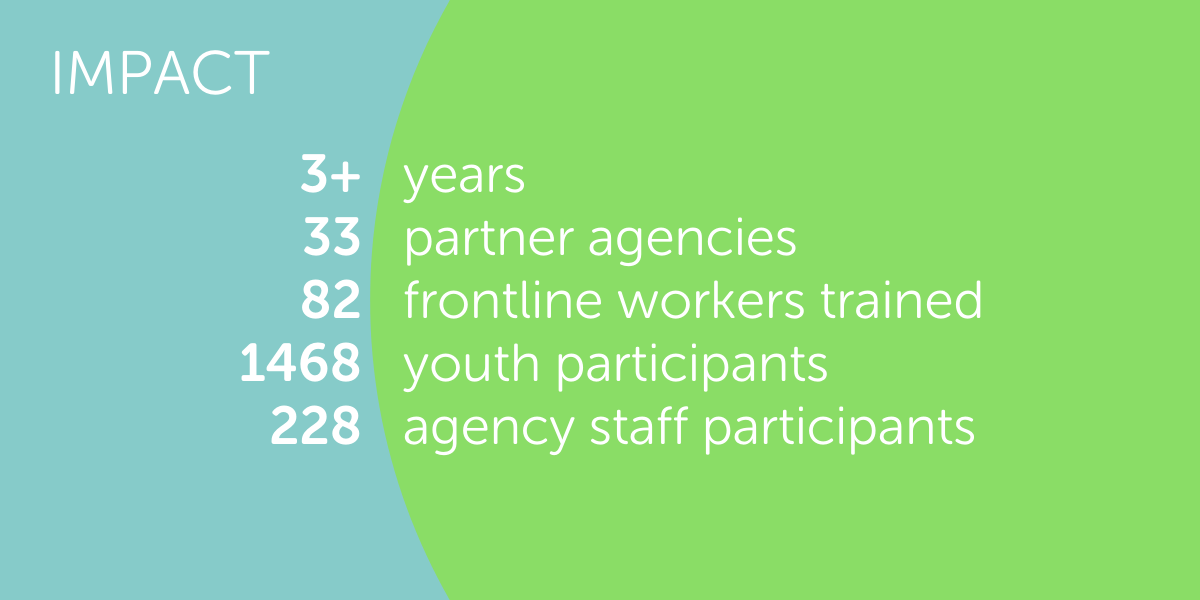Grow Mindfulness for Youth
In 2019, the Centre for Mindfulness Studies received a 3-year Grow grant from the Ontario Trillium Foundation. The goal was to train 60 front-line workers across 15 youth-serving agencies in Toronto to deliver two mindfulness-based programs to underserved youth and their coworkers.
This project has brought much-needed mental health support to underserved youth in Toronto, and did so at a particularly difficult time during the pandemic. Not only were the project goals exceeded, but a lasting impact was made on participants which set a foundation to extend similar mindfulness programs across Ontario and beyond.
We are immensely proud of this project and want to thank the Ontario Trillium Foundation for it’s generous support, as well as the faculty, front-line workers, and youth participants who made this all possible.
To learn more about the impact and what participants had to say, check out the video below:
“Mindfulness-based practices have helped me a lot at managing my stress. Instead of panicking or being anxious or trying to control everything I need to do, I have more space for myself to let things be and unfold. I find it very helpful because with that sense of space, things turn out well. These practices can help young people, especially the youth I’m working with, who are dealing with a lot of mental health concerns. It’s helpful to have a tool wherein they don’t need to be overwhelmed all the time.
A simple breathing exercise or a moment to focus on something to find themselves grounded can help them be less stressed out. I’m looking forward to sharing what I’ve learned so far as I think it can help them along the way.“


Leslie-Ann Fullerton: Grow program participant and Outreach/CTI Counsellor at Elizabeth Fry Toronto
Read her blog: Mindfulness for Women Series: Staying Grounded in Uncertain Times


The best way to deliver effective mindfulness programs to youth is to train the people who serve them. The training is thorough, including:
- Development of a personal mindfulness practice;
- Training to teach evidence-based programs;
- Ongoing mentorship and support over 3 years, to ensure the trainees’ capacity in practising, teaching and sharing their knowledge.
This project builds on the success of two proven programs, mindfulness-based wellness (MBW) and mindfulness-based intervention (MBI), to train the front-line workers to deliver an integrated mental health program to their youth clients.
Over 6o front-line workers are participating:
“I personally thought I knew what it was to be mindful, but this training has truly taught me what it is and the importance to practice and share what I have learned.” Front-line worker after receiving MBW training
- The interventions can be delivered outside a clinical setting (clinical = mental health facilities and/or institutions), which suits a population often averse to entering the mental health system.
- Mindfulness programs are best delivered in a group format, increasing the capacity to support this population and lowering the cost.
- Maintenance is critical to the effectiveness of the program and the front-line workers can be trained to provide these supports within the community, again lowering costs.
- 1,468 youth benefitted from mindfulness training. Program evaluation showed that the mindfulness training significantly decreased perceived stress and improved well-being in youth. The participants were equipped with skills and tools to skills to manage stress, approach challenging situations with mindfulness, and improve general wellbeing. They cultivated connections and compassion for themselves and others.
- 82 front-line workers trained in mindfulness to increase resiliency, grow skills and prevent burnout
- 33 youth-serving agencies equipped to continue to offer these programs to thousands of their young clients
- Over three years of collaboration, community-building and coordination of services within and between agencies
- Learnings and evidence from the program will support the development and funding of future programs across Ontario and beyond
We partnered with over 30 leading youth-serving agencies:
[su_row][su_column size=”1/2″ center=”no” class=””]
- AboutFace
- Arrabon House
- Big Brothers Big Sisters Toronto
- Bramptom Salvation Army Queen Youth Shelter
- Catholic Family Servies
- Covenant House
- CultureLink
- Dixon Hall
- East Metro Youth Services
- Elizabeth Fry Toronto
- Friends of Ruby
- Global Leadership Village/Sacred Women International
- Hamilton Community Legal Clinic
- Jessie’s – The June Callwood Centre for Young Women
- LOFT Community Services
[/su_column] [su_column size=”1/2″ center=”no” class=””]
- Massey Centre
- Planned Parenthood Toronto
- Rose of Sharon Services for Young Mothers
- Reconnect Commuity Health Services
- Sheena’s Place
- SKETCH Working Arts
- Springboard Services
- St. Michael’s Family Health Team
- Stella’s Place
- StepStones for Youth
- Strides Toronto
- Surrey Place
- WE Charity
- West Hill Collegiate
- West Neighbourhood House
- WoodGreen Community Services
- Youthlink
- Youth Without Shelter
- YWCA Toronto
[/su_column][/su_row]
If you wish to support our work, please donate here.




